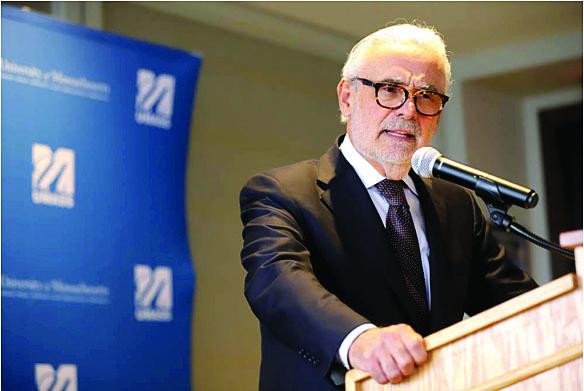August 6, 2020

Marcelo Suarez-Orozco assumes reigns at UMass Boston.
‘Special advisor for Black Life’ position is set
In his first day on the job Monday, new UMass Boston Chancellor Marcelo Suarez-Orozco warned that simultaneous crises pose “great threats” to equality and set his sights on working toward racial justice in higher education.
Suarez-Orozco wrote a lengthy letter to UMass Boston faculty, staff, and students to kick off his tenure, announcing that he would create a new leadership position on the campus aimed at improving the educational experience for Black students.
By announcing the new Special Advisor to the Chancellor for Black Life at UMass Boston, Suarez-Orozco immediately targeted equity as a top priority on one of the most diverse public campuses in the state, albeit one that will be without students this fall since it is offering only remote classes.
“The Special Advisor will work with me and my leadership team as we commit to create new structures and to develop new codified and customary practices purposefully designed to put UMass Boston at the forefront of excellence, engagement, and relevance on racial justice, equity, diversity, and inclusion,” he wrote. “A call for nominations and additional details will be forthcoming following the completion of constituent discussion.”
Suarez-Orozco also told the campus that he and his wife, Carola, together launched a new scholarship fund in honor of George Floyd, an unarmed Black man who died after Derek Chauvin, a white Minneapolis police officer, knelt on his neck during an arrest for more than eight minutes.
The couple seeded the George Floyd Honorary Scholarship Fund with $50,000 of their own money, and Suarez-Orozco said additional donors have added more than $100,000 to the scholarship “to provide financial support to our talented students who otherwise may find it difficult or impossible to pay for a college education.”
Nearly six in 10 UMass Boston undergraduates are first-generation college students, many of whom are non-white, according to data published by the school.
Suarez-Orozco, an Argentinian immigrant who for close to a decade helmed UCLA’s Graduate School of Education and Information Studies, was selected unanimously as UMass Boston’s next top leader in February.
He now starts as the first permanent chancellor at UMass Boston in more than three years. Interim chancellors have led the campus since June 2017, and the first search process for a full-time successor collapsed in May 2018 when all three finalists withdrew following campus visits.
He started Monday amid a time of upheaval nationally and, specifically, in higher education. Colleges and universities are reeling from the effects of the COVID-19 pandemic, facing budget gaps and questions over how to safely plan for a fall semester amid the ongoing public health crisis.
The new chancellor said his first official action will be to communicate with various communities on how UMass Boston can offer the best learning environment possible while mitigating “the malignant effects of the COVID pandemic, its calamitous wake on the economy, and the budgetary undertow we all face moving forward.”
UMass Boston trimmed about $34 million from its original fiscal year 2021 budget, more than half of which came with workforce impacts such as layoffs, furloughs, or leaving positions vacant, according to budget documents.
Overall, the UMass system faced a $264 million budget gap amid the pandemic, and trustees opted to support cutting some jobs while keeping tuition frozen to lessen the strain on families and keep the schools an attractive option while state tax revenues — an integral part of their budget — crater.
Suarez-Orozco also gestured toward a new nationwide reckoning with centuries of racism, warning that “systemic racism, hatred, and police brutality stand in complete opposition to a humane civilization and to the elemental requirements for the practice of democratic citizenship.”
“To be sure, we face grave threats “from a ravaging pandemic, particularly devastating to communities of color, to unchecked climate change extracting untold suffering in the world’s poorest regions, to the structural racialization of inequality and the intergenerational persistence of anti-blackness, to xenophobia and exclusionary anti-immigrant policies,” Suarez-Orozco wrote.
“My life work stands for a higher education agenda of excellence animated by an ethic of care and solidarity, an ethic of preference to the least empowered amongst us, an ethic of dignity and human rights, and an ethic of engagement and service to others.”
He described education as an “indispensable tool” for overcoming inequality and pledged that UMass Boston would strive to be “the university of and for the city and the university of and for the times.”


